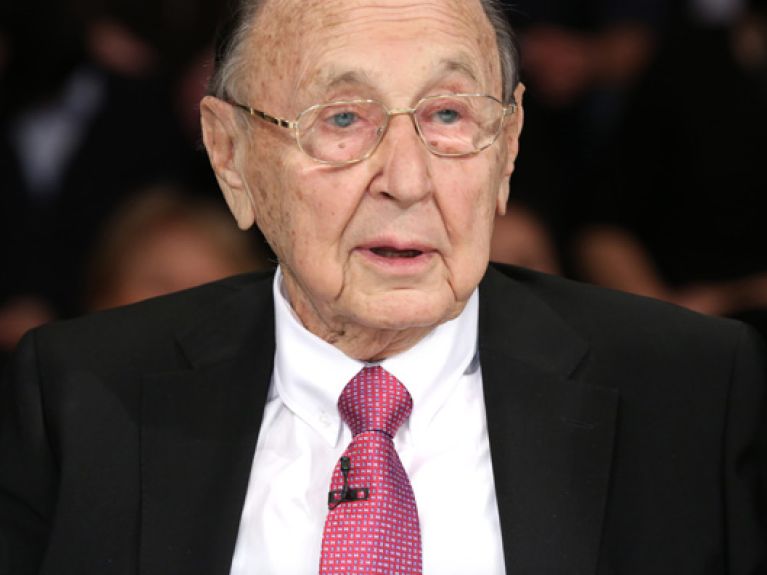Hans-Dietrich Genscher on the Prague Embassy refugees
A dossier on the 25th anniversary of the fall of the Wall. In Part 11, Hans-Dietrich Genscher, Germany’s former Foreign Minister, recalls the events of the time.

Moving scenes occurred at the German Embassy in Prague in the summer of 1989: approximately 4,500 GDR citizens had taken refuge in the Embassy garden and were demanding the right to depart for the West. On 30 September, Hans-Dietrich Genscher, the German Foreign Minister at the time, appeared on the balcony of the Embassy and spoke to them.
Mr Genscher, you never finished the sentence “We have come to you to tell you that today your departure…” Although your words were drowned in cries of jubilation, they remain unforgotten. Did you have any inkling of how momentous these words would be?
We did have some inkling that the opening of the Embassy’s gates would be an event of the greatest importance. Only 20 day earlier the GDR leadership had protested furiously against the opening of the frontier by the Hungarian government. That’s why the events in the Prague Embassy were a turning point. Looking back, we can say that the people in the Embassy garden took charge of their own destiny and wrote history.
How did you experience the mood of the waiting people?
The atmosphere was fraught with tension. What will he tell us? The liberating words about a possible departure were hoped for and probably even expected by many. But when I then said that the trains would travel through the GDR, the mood changed. Again there was an outpouring of all the feelings of hostility and dissatisfaction against a leadership that the people believed capable of a breach of promise even in this situation.
“The trains had the effect of beacons of freedom”
How difficult were the negotiations you had conducted earlier on the edge of the UN General Assembly in New York?
I received a great deal of understanding from our friends and a great deal of support. The reaction of Eduard Shevardnadze, the Soviet Foreign Minister, was especially compassionate. Also impressive was the attitude of Oskar Fischer, the GDR Foreign Minister who was endeavouring to find a solution. However, he could only make suggestions to the leadership, he had no decision-making powers. Eventually, as one of two possible solutions, I proposed that the refugees be released from GDR citizenship by GDR consular officials in our Embassy – to preserve GDR sovereignty. The second option was that the trains went through the GDR. That meant the refugees would return to GDR territory, even if only for just under one hour. That fact that the leadership chose option B showed just how divorced from reality they were: the trains had the effect not of vehicles of escape, but beacons of freedom.
It is often said that young people today know too little about German-German history. Is there a lack of historical awareness 25 years after the fall of the Wall?
I do not share that opinion. I make very frequent visits to schools and universities, where I encounter a younger generation that in the best sense of the word is curious about history and attempts with a great deal of interest to understand what happened then. Perhaps some older fellow citizens have problems with the answers to their questions. Usually this is because they accepted the division and did not understand that it was by no means only a matter of a separation of states, but of saying “yes” or “no” to freedom and human dignity. Let us hope that an examination of this part of our history will strengthen awareness of the importance of Article 1 of our Basic Law: “Human dignity shall be inviolable.”

